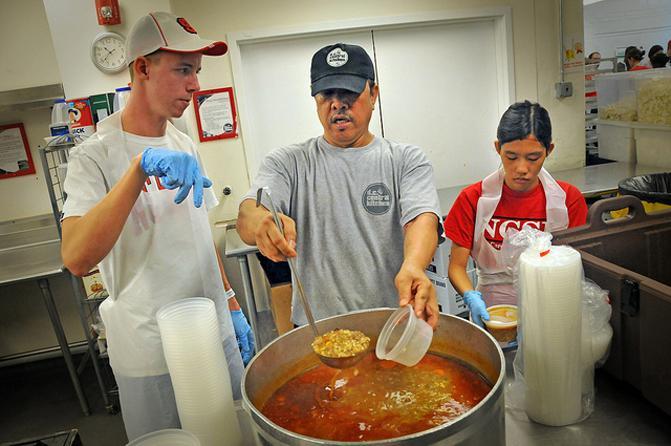While many N.C . State students are anxious to find the perfect sunny oasis where they can relax their spring break away, others are opting to spend the week abroad with the mission to serve and to learn.
Through the Center for Student Leadership, Ethics, and Public Service’s Alternative Service Break program, approximately 350 students and faculty members are traveling outside the U.S . for spring break. Divided into 20 teams, participants will spend the week completing service projects in the countries of their choosing while learning about themselves and the region they visit as they absorb the culture.
According to Adam Culley , assistant director of the ASB program, students applied for the program last fall and ranked their top trip choices based on location and project idea. Countries were chosen based on partnerships formed with organizations there, such as Habitat for Humanity and Outreach360 . Student trip leaders, two per group, selected applicants who would contribute positive energy and their own diverse experiences. A faculty advisor also travels with each team.
“Applications are due in the fall because we build the teams very early in the year,” Culley said. “It is important that they bond and get to know each other and the places they will visit.” He has been working with CSLEPS since 2004 and said that the University has sponsored ASB trips since 1999.
The ASB program encompasses service trips during Fall, Winter and Spring Break each year. These trips were designed specifically with college students in mind, according to Culley .
“The program provides a great opportunity for students to give back to the community they travel to while exploring and becoming immersed in the culture,” Culley said.
The trips were planned to enable students to serve and learn simultaneously, which is the core mission of the CSLEPS program. Participants are encouraged to draw meaning from their experiences and reflect on what they learn.
“During winter break students were building homes in the Dominican Republic,” Culley said. “They were not only doing service but going beyond that to look at social, political and ethical issues that play into that.”
The ASB trips during spring break are generally longer than other trips and include more participants, thus requiring more preparation. Another reason the deadline to apply is so far in advance is to allow time for training the student leaders, researching the locations and figuring out travel logistics.
“I teach a 3-credit-hour course for team leaders,” Culley said. “The course covers everything, from how to budget the trip and schedule flights to theories on creating leadership opportunities on the trips.”
Teams are also encouraged to fundraise throughout the year to offset the cost of the trips. Students pay their own way and trips can range anywhere from $300 to $2000, depending on length of the stay and location. Culley said airfare generally poses the biggest financial challenge.
Cam White, a junior in meteorology, is co-leading a trip to Belize over spring break. His team has spent the past few months researching the Belizean way of life in preparation for the trip.
“Our team meets once a month to discuss social issues there,” White said. “We’ve focused on environmental issues and fair trade.” In Belize, White’s team will work alongside local farmers to build drying racks and fermentation boxes for cacao, the plant that is processed into chocolate.
Brian Parham , a senior in biology, began his experience in the ASB program with a trip to Belize in the spring of his freshman year. This spring break, Parham is co-leading a trip to Costa Rica.
“We will be working on rainforest conservation,” Parham said. His team will stay at a biological reserve in Tirimbina and will potentially do service work with caterpillar researchers there. Their daily itinerary includes spending time with elementary school students, touring a banana plantation, and meeting with an agro community.
“Costa Rica is probably the most conservation-minded country in the western hemisphere,” Parham said. He said over 25 percent of their land is protected.
Parham stressed the importance of reflections throughout the team’s experiences in Costa Rica.
“We will make time each day for group and individual reflection,” Parham said. “This trip goes beyond the actual service. We want to look at the impact of the experience on each of the members of the group and learn from one another.”
White maintains a similar perspective regarding the importance of learning from one another. He said the program is much more than just traveling, it’s about connecting with people all along the way.
“The ASB program does a great job of encouraging students to learn about the culture and its people, and how to interact with them and help them with problems they are facing,” White said. “It is a great experience because students are exposed to social issues both in the U.S . and abroad.”








